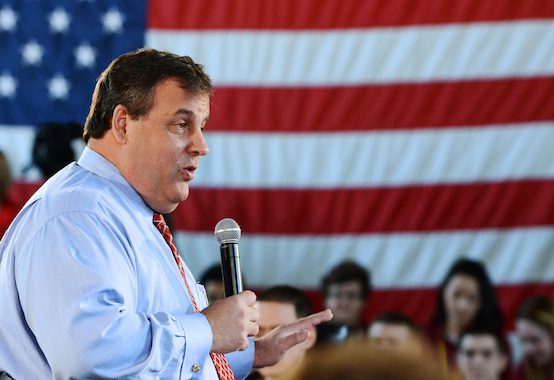The Man to Reestablish the GOP—Maybe

If the battles roiling the Republican Party over the last four years were a Star Wars film, last week’s elections might be titled “The Establishment Strikes Back.” No matter what you call it, the star is Chris Christie.
After suffering repeated indignities at the hands of conservative activists and political neophytes, the party’s donors, consultants, and less Tea Party-friendly politicians reminded the country that they too can win—and also sit on their hands whenever the GOP nominates candidates they dislike, just as much as any grassroots conservative group.
But this bit of conventional wisdom, while truer than most, can be overstated. The Virginia GOP’s struggle to reconcile its socially conservative and more moderate business über alles wings predates the Tea Party. Christie first rose to national prominence not as a pragmatist but a tough-talker who wasn’t afraid to tell members of government unions—even public school teachers—to jump in a lake.
In fact, Christie’s bad reputation with many Tea Party types stems at least as much from withholding his tongue lashings from Barack Obama—or directing them toward conservative excesses—as his genuine offenses against conservative ideology.
Personality explains Christie’s success more than pragmatism. The New Jersey governor may not be a moral crusader, but unlike Rudy Giuliani, Bill Weld, and his predecessor Christine Todd Whitman, he has been quite socially conservative for a blue state. He held out against gay marriage as long as politically feasible—albeit without taking many risks—and vetoed Planned Parenthood funding five times.
If Christie is the 2016 Republican presidential nominee, fully expect the Democrats to run the usual ads inveighing against social extremism and the war on women. They will probably have some impact, but they won’t be as effective as they were against Ken Cuccinelli.
Negative advertising is most successful when it reinforces bad things voters already believe about the candidate. Michael Dukakis as the ineffectual, criminal-coddling dweeb peering out of a tank resonated with the persuadable portion of the electorate. Attacks on the affable Ronald Reagan and the cautious Barack Obama as radicals did not.
Those who deny Christie can win the Republican nomination because of the party’s rightward shift are ignoring two things. The first is Christie’s undeniable political talent (watch him kill his Democratic challenger with kindness for just one recent example).
The second is that the last two Republican nominees were far less talented—or were at least incompatible with the prevailing political climate—and arguably less conservative establishment candidates: John McCain and Mitt Romney.
But it’s true that Christie isn’t guaranteed the nomination. While many Republicans will be eager just to be rid of Democratic presidents, no matter what ideological transgressions they must tolerate in the process, the segment of the party that prefers beautiful losers to imperfect winners is larger than ever.
Moreover, Christie will face stronger conservative competition than did Romney and McCain. Rand Paul, Ted Cruz, and Marco Rubio all have their flaws. But they have each demonstrated considerable political talent themselves, even if none of them has yet to completely pull it together. And they would each approach the primaries on somewhat more even terms with the frontrunner than a man six years removed from losing his Senate seat or a collection of candidates who seemed to be running for talk show host.
In a not-too-subtle dig at Rubio’s oratory and the Paul-Cruz filibusters, Christie will try to run as the Republican who actually got things done. He will say that he can both work with Democrats and beat them in hostile territory on the biggest stage.
If Christie is not careful, he might come across as a repeat of both Giuliani and George W. Bush. Like Bush, Christie will be running on his ballot-box and bipartisan successes, his impressive-for-a-Republican showing among minority voters, and the contrast between himself and the bickering divided government in Washington.
Bush failed to replicate much of his Texas experience nationally, a real possibility for Christie as well. It is easier to run against a polarizing incumbent governor or a sacrificial-lamb challenger abandoned by the Democrats, as they both did in state politics, than to best a fully invested national challenger.
In an effort to distinguish himself from Cruz and especially Paul, Christie has also at times sounded like Bush-Giuliani 2.0 on foreign policy and civil liberties. This is an abandonment of the more nuanced approach he took in his 2011 speech at the Reagan Library, which didn’t break with neoconservative orthodoxy in any of its particulars, but at least paid lip service to the concerns of less interventionist conservatives in the party.
If a vote for Christie is seen as a vote for bluster at home and bombing abroad, he won’t live up to his potential to grow the Republican Party as much as some of his Tea Party opponents might.
W. James Antle III is editor of the Daily Caller News Foundation and author of Devouring Freedom: Can Big Government Ever Be Stopped?
Comments